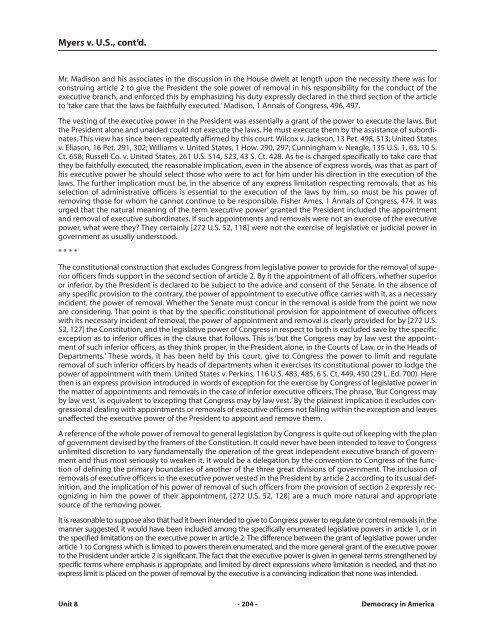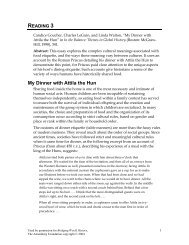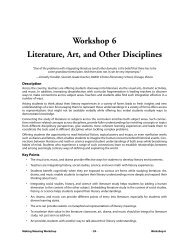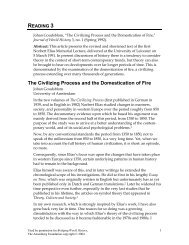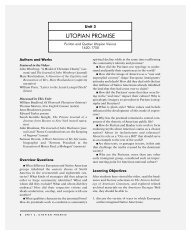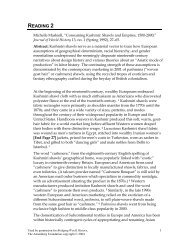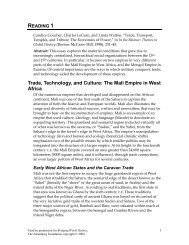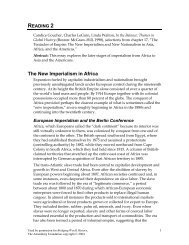Download Unit 8 Readings, Bureaucracy: A Controversial Necessity
Download Unit 8 Readings, Bureaucracy: A Controversial Necessity
Download Unit 8 Readings, Bureaucracy: A Controversial Necessity
Create successful ePaper yourself
Turn your PDF publications into a flip-book with our unique Google optimized e-Paper software.
Myers v. U.S., cont’d.<br />
Mr. Madison and his associates in the discussion in the House dwelt at length upon the necessity there was for<br />
construing article 2 to give the President the sole power of removal in his responsibility for the conduct of the<br />
executive branch, and enforced this by emphasizing his duty expressly declared in the third section of the article<br />
to ‘take care that the laws be faithfully executed.’ Madison, 1 Annals of Congress, 496, 497.<br />
The vesting of the executive power in the President was essentially a grant of the power to execute the laws. But<br />
the President alone and unaided could not execute the laws. He must execute them by the assistance of subordinates.<br />
This view has since been repeatedly affirmed by this court. Wilcox v. Jackson, 13 Pet. 498, 513; <strong>Unit</strong>ed States<br />
v. Eliason, 16 Pet. 291, 302; Williams v. <strong>Unit</strong>ed States, 1 How. 290, 297; Cunningham v. Neagle, 135 U.S. 1, 63, 10 S.<br />
Ct. 658; Russell Co. v. <strong>Unit</strong>ed States, 261 U.S. 514, 523, 43 S. Ct. 428. As he is charged specifically to take care that<br />
they be faithfully executed, the reasonable implication, even in the absence of express words, was that as part of<br />
his executive power he should select those who were to act for him under his direction in the execution of the<br />
laws. The further implication must be, in the absence of any express limitation respecting removals, that as his<br />
selection of administrative officers is essential to the execution of the laws by him, so must be his power of<br />
removing those for whom he cannot continue to be responsible. Fisher Ames, 1 Annals of Congress, 474. It was<br />
urged that the natural meaning of the term ‘executive power’ granted the President included the appointment<br />
and removal of executive subordinates. If such appointments and removals were not an exercise of the executive<br />
power, what were they? They certainly [272 U.S. 52, 118] were not the exercise of legislative or judicial power in<br />
government as usually understood.<br />
* * * *<br />
The constitutional construction that excludes Congress from legislative power to provide for the removal of superior<br />
officers finds support in the second section of article 2. By it the appointment of all officers, whether superior<br />
or inferior, by the President is declared to be subject to the advice and consent of the Senate. In the absence of<br />
any specific provision to the contrary, the power of appointment to executive office carries with it, as a necessary<br />
incident, the power of removal. Whether the Senate must concur in the removal is aside from the point we now<br />
are considering. That point is that by the specific constitutional provision for appointment of executive officers<br />
with its necessary incident of removal, the power of appointment and removal is clearly provided for by [272 U.S.<br />
52, 127] the Constitution, and the legislative power of Congress in respect to both is excluded save by the specific<br />
exception as to inferior offices in the clause that follows. This is ‘but the Congress may by law vest the appointment<br />
of such inferior officers, as they think proper, in the President alone, in the Courts of Law, or in the Heads of<br />
Departments.’ These words, it has been held by this court, give to Congress the power to limit and regulate<br />
removal of such inferior officers by heads of departments when it exercises its constitutional power to lodge the<br />
power of appointment with them. <strong>Unit</strong>ed States v. Perkins, 116 U.S. 483, 485, 6 S. Ct. 449, 450 (29 L. Ed. 700). Here<br />
then is an express provision introduced in words of exception for the exercise by Congress of legislative power in<br />
the matter of appointments and removals in the case of inferior executive officers. The phrase, ‘But Congress may<br />
by law vest,’ is equivalent to ‘excepting that Congress may by law vest.’ By the plainest implication it excludes congressional<br />
dealing with appointments or removals of executive officers not falling within the exception and leaves<br />
unaffected the executive power of the President to appoint and remove them.<br />
A reference of the whole power of removal to general legislation by Congress is quite out of keeping with the plan<br />
of government devised by the framers of the Constitution. It could never have been intended to leave to Congress<br />
unlimited discretion to vary fundamentally the operation of the great independent executive branch of government<br />
and thus most seriously to weaken it. It would be a delegation by the convention to Congress of the function<br />
of defining the primary boundaries of another of the three great divisions of government. The inclusion of<br />
removals of executive officers in the executive power vested in the President by article 2 according to its usual definition,<br />
and the implication of his power of removal of such officers from the provision of section 2 expressly recognizing<br />
in him the power of their appointment, [272 U.S. 52, 128] are a much more natural and appropriate<br />
source of the removing power.<br />
It is reasonable to suppose also that had it been intended to give to Congress power to regulate or control removals in the<br />
manner suggested, it would have been included among the specifically enumerated legislative powers in article 1, or in<br />
the specified limitations on the executive power in article 2. The difference between the grant of legislative power under<br />
article 1 to Congress which is limited to powers therein enumerated, and the more general grant of the executive power<br />
to the President under article 2 is significant. The fact that the executive power is given in general terms strengthened by<br />
specific terms where emphasis is appropriate, and limited by direct expressions where limitation is needed, and that no<br />
express limit is placed on the power of removal by the executive is a convincing indication that none was intended.<br />
<strong>Unit</strong> 8 - 204 - Democracy in America


